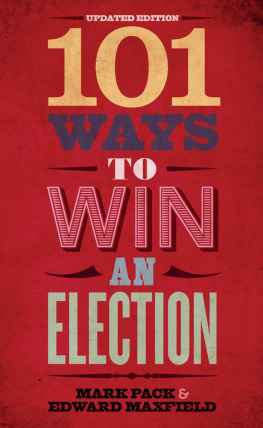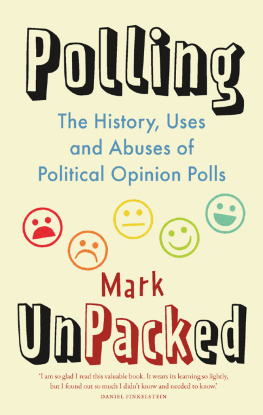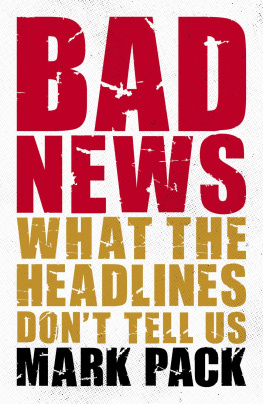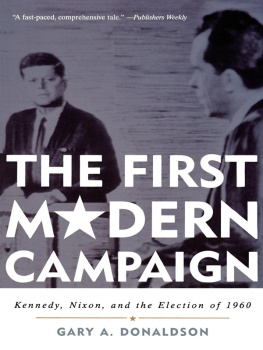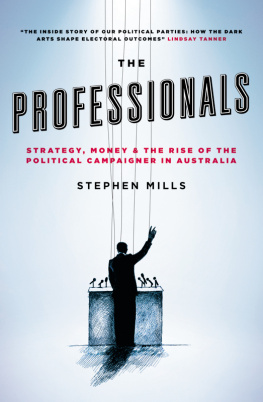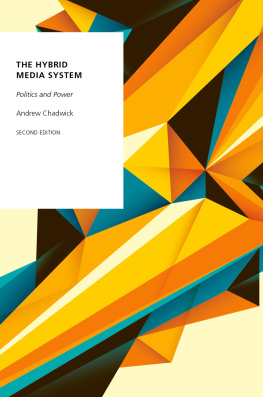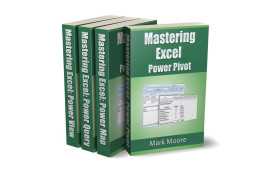A s with the first edition, our debts to people we have learned about campaigning from over the years colleagues, rivals and commentators are huge. Singling out any individuals is a hazardous business.
Once again, however, the team at Biteback this time Olivia Beattie and Laurie De Decker have been unfailing in their encouragement and expertise. Without them there would be a few blog posts floating around the internet from us rather than this complete book. Thank you.
The man who grasps principles can successfully select his own methods. The man who tries methods, ignoring principles, is sure to have trouble.
Ralph Waldo Emerson
T here is a legend about election campaigning in a northern English city from several decades back that involves a mattress, a van, a camera and a ruthless willingness to do what it takes to win.
The legend has it that a guerrilla band of community campaigners shipped the battered mattress from neighbourhood to neighbourhood, dumping it on a street corner at night, photographing it in the morning and reporting it to the city council. Newsletters were printed and distributed to local homes. The council was damned for neglecting the area. A campaign was launched demanding a clean-up. Candidates were run and City Hall was taken. The old guard was ejected from power by a committed team that learned how to communicate with voters and how to galvanise them into action.
It does not matter whether the story is true or false. What matters is what it tells us about the ability of skilled campaigners to change the game.
They understood the core theme that runs through this book: if you want to be elected, you need something to say about things people care about (the message), the ability to say it (the team and the resources), to say it frequently and well (communicate), and the leadership to do all this to an excellent level.
This book draws on each of those themes and expands them into a how to guide for winning an election, giving you 101 tips, each with its own self-contained short chapter.
We draw extensively on our experiences in winning (and losing) campaigns from our time as campaign helpers, candidates and most frequently professional campaign managers.
Although we have written the book as addressed to (would-be) candidates, it is useful for anyone involved in any other campaign role too. We also hope it will be interesting to those who are on the receiving ends of campaigns and who wonder quite what is being done and why in the name of winning their vote.
Democracy seems to have come in for a bit of a battering in recent years. We passionately believe in the power of liberal democracy to deliver good and accountable government. Our aim, in writing this book, was to encourage people to get involved and to show how effective campaigning can strengthen the bond between electors and the elected.
We were struck by a newspeper vox pop at the time of the parliamentary expenses scandal in the UK. Asked what should be done to increase voter turnout, one person simply replied, Give us better politicians. In a small way we hope this book will help to achieve this end.
I n this opening section, we ask the most important question: why are you running for election? We explain why you need to have a clear answer containing an effective campaign message.
Good campaign messages rest on two choices. Continuity or change? Darth Vader or Father Dougal?
The first is probably the most obvious to you are you arguing for a continuation of good times or for the need to change away from bad times? Often the answer depends on whether you or your party are in power or opposition. It can be hardest to answer when a new person is seeking to succeed an incumbent of their own party.
The second is a question taken from one of our colleagues, Steve van Riel, who suggests that leading politicians can be seen as effective, even if unlikable (Darth Vader), or as caring and consensual, even if ineffectual (Father Dougal from the Father Ted comedy show).
The ideal, of course, is to be both effective and popular. The more prosaic reality is to work out which is your strength and play to it, and which is your weakness and ameliorate it.
With that in mind, let us talk about the details
There are those that look at things the way they are, and ask why? I dream of things that never were, and ask why not? Robert Fitzgerald Kennedy
N ew York Governor Mario Cuomo uttered the famous line that politicians campaign in poetry and govern in prose. We are idealistic enough to believe that there is room for a little poetry in government, too, but the magic of a well-run campaign can have the same uplifting and enlightening impact as the best of poetry. Just as the best poets have a powerful and emotional message they want to give the reader, so the best campaigners want to appeal to voters minds and to move their emotions. Democracy is about explaining to people why you and your ideas are the best choice.
Repeatedly in the course of this book we will remind you that voters lead busy lives, disconnected from government and politics. As a candidate and a campaigner you will only have brief moments to make your point to them and to make an impact. Your message why someone should vote for you should be a simple answer to a simple question. It is surprising how often it catches out aspiring politicians.
Shortly before the 2010 general election in Britain, we were involved in running a training event for incumbents facing a tough battle for re-election.
One session was about the message. One of the trainers asked each Member of Parliament (without any advance warning) that simple question: why should someone vote for you? Some of the answers were rather rough round the edges. One, however, stood out. This MP even though they were not the first to answer and so had a little longer to think about it than some colleagues was utterly floored. The only answers they could provide were about themselves: because they wanted to be an MP, because they liked doing it and so on. They lost at the next election.
The lesson is a simple one: you need to give voters a reason to vote for you that will be relevant to them. Your answer needs to be about you but appeal to them. I want to win does not work. You want me to win does.
Look at the example of the successful Conservative campaign in the 2015 UK general election. It focused in on what the election result could mean for the personal finances and job security of voters in this case persuading them that a LabourSNP coalition would endanger their jobs and make them financially worse off. Honed by campaign mastermind Lynton Crosby, the message wasnt about Please elect us because we want to win but rather Make yourselves better off by electing us.
Nevertheless, beware bland platitudes, too. Your message needs to capture why you will do a better job than the others will. It needs to be brief, credible and real. Brief because voters have better things to do than listen to you. Credible because voters are smart enough to figure out when it is snake oil on offer. Real because you need to believe it too only then will you be able make your case convincingly.
Voters are not memory magicians. They do not remember everything everyone says, especially on a topic such as politics that most of them spend most of their time paying little attention to. We will talk a lot in this book about the ways you can communicate your message. You will know it is working when people start repeating your own lines back to you without realising they are doing so. Much of that is about repetition but it starts with a message that is clear, powerful and succinct.

